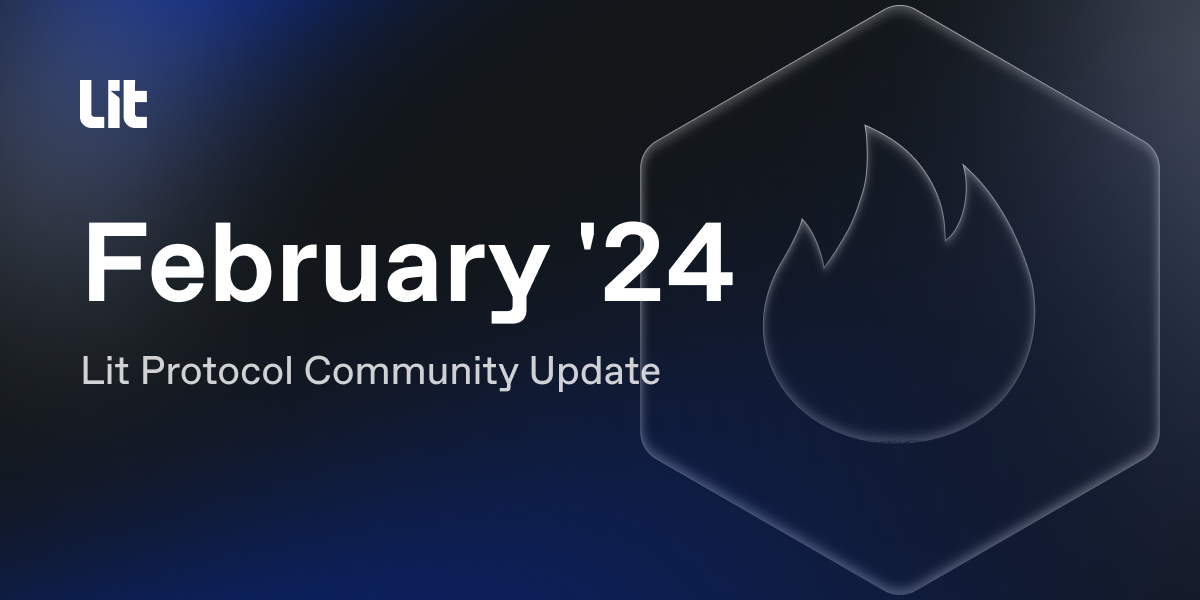Lit Protocol Community Update: February '24
Read about the latest updates from around the Lit ecosystem.

Lit is a decentralized key management network and developer platform. Lit enables developers to create and manage keys for almost any application that can be made private, immutable, and autonomous.
Intro.
GM all, coming at you with the first community update of the new year! This update will be jam-packed with all of the latest developments, feature releases, and important updates to Lit from the last couple of months.
To learn more about Lit, check out the dev docs and join the community on X, Discord, and Telegram.
Without further ado, let’s dive in.
General Updates.
Introduction to Lit Protocol
Lit v0 is Live
After three years of R&D Lit is now live and managing real world assets. With the v0 launch, two new networks have been introduced:
- The Habanero Mainnet Beta: The keys created and managed on the Habanero Mainnet Beta are ready to be used for deploying production applications. This means that sending, receiving, and managing real world assets IS supported. Any keys that are created on the Habanero network are persistent and will not be deleted, though key migration will be required when the v1 network is released later this year. In order to deploy to Habanero, you’ll need to connect to the appropriate branch using the v3 SDK.Please note that the Habanero network has limited capacity and you’ll need capacity credits to use the network without restrictions. If you’re building in production and want to use Habanero, please fill out this test token request form.
- The Manzano Testnet: If you are currently in early-stage development, you should be using the Manzano Testnet. Sending, receiving, and managing real world assets on Manzano is NOT recommended. In order to deploy to Manzano, you’ll need to connect to the appropriate branch using the v3 SDK. Manzano should only be used for test applications where data persistence is not guaranteed.
You can check out the full v0 announcement here.
Lit Node Code Open-Sourced
The open source Lit node code and contracts have been published on GitHub. This repo will continue to be updated with code snapshots as necessary upgrades to the protocol are pushed ahead of the v1 network launch later this year.
The code has gone through several audits and the reports can be viewed here.
Lit Whitepaper
The Lit whitepaper v1 has just been published. You can access the paper on GitHub for a comprehensive overview of Lit, including core use cases, underlying architecture, and key cryptographic primitives being used.
SDK v3
The SDK v3 is now live and the official default when building with Lit. In order to deploy to Habanero or Manzano, you’ll need to use v3. You can follow this guide to learn how to make the migration from previous SDK versions.
To install the SDK v3, you can follow the guide in the developer docs.
Developer Docs Updated
With the v0 launch, there have been several important updates to how builders can engage with Lit. This includes:
- Capacity Credits: Usage of Lit v0 is rate limited, and you’ll need to reserve capacity to use the network without restrictions. You can do so using Capacity Credits, which entitle holders to a configurable number of requests (measured in requests per second) over a fixed length of time (i.e. one week). You can mint Capacity Credits on behalf of your users, allowing you to abstract away all payment details from the end user. Follow the docs to learn more.
- Installing the Lit SDK v3: As announced above, the Lit SDK v3 is now fully live and the default when interacting with Lit v0. Check out the docs to learn how you can work with the SDK in the browser or server side using Node.js. Remember to input the relevant network in your client config, based on where you’re building (the default in the docs is the Cayenne testnet).
- V0 Migration Guide: This section provides some guidance on how to migrate your keys and data from a previous network (Jalapeno, Serrano, or Cayenne) to the Habanero Mainnet Beta. Included in the guide are tips on performing re-encryption and re-minting PKPs with the same auth method on the new network. If you need support on migration, please give the team a ping in Discord or in the Lit Builders channel on Telegram.
- Lit Networks: Check out the ‘Lit Networks’ section to read about all of the currently active Lit networks and the specific features each supports. This includes 'test' networks (NOT designed for storing real world assets) and ‘main’ networks (designed for storing real world assets.)
Around the Ecosystem.
Fox Introduces VERIFY: An Open Protocol for Content Verification and Licensing
The Fox Corporation recently announced the release of VERIFY, a protocol that provides a framework for content creators and consumers alike to ensure the information they encounter online is not only genuine but also comes from an attributable source. The protocol uses Lit to enable users to impose specific access rules on their content, restricting access only to those who meet set conditions. These conditions may use on or off-chain state, giving creators high flexibility in defining the ways in which their content is consumed.
Lit on the Web3 Galaxy Brain Podcast
Lit’s co-founders, David and Chris, joined the Web3 Galaxy Brain podcast last week to talk about how Lit Protocol was born, the pain points it is aiming to solve, how it works, potential applications, and more. You can listen to the episode wherever you get your podcasts.
Revolutionizing Security with Decentralized Keys
David joined Protocol Labs' “Founders” series to talk about the history of and inspiration behind Lit Protocol, why decentralized key management is so important, and the role distributed systems play in securing our online interactions and data. Give it a listen!
Teams Building on Lit
Take a look at some of the projects and use cases being built on Lit v0:
User Wallets: Lit is being used as a decentralized key management solution for wallets and onboarding experiences being built by the teams at Collab.Land, Infinex, Obvious, Patch, Silk, and Burnt. These products have taken the form of wallet applications, account abstraction signers, and embedded wallets on existing platforms like Telegram and Discord.
Identity: Projects like Oamo, Krebit, Terminal3, Holonym, AlphaCapture, and Gateway use Lit to power the selective disclosure of encrypted data and credentials, giving users the ability to control how their information is accessed, managed, and monetized.
Data Marketplaces: Protocols like Cheqd, KaratDAO, Index, and Streamr use Lit for encryption in the commercialization of data, powering trustless marketplaces being built on blockchains and the open web.
Developer Tooling: Projects like Alchemy, Pimlico, Openfort, Lens Protocol, Orbis, Spheron, and Snowball are using the generalized services provided by Lit and making them available for developers in the form of SDKs, powering specific use cases like account abstraction, private data on web3 social, token gated chat, and mobile wallet tooling.
Digital Product NFTs: Teams like Crossmint, Molecule, Alexandria, CharmVerse, and Anotherblock use Lit to meet their consumer demand for more creative utility for digital assets, like unlockable NFTs and for selective decryption for managing IP rights.
Lit v0 Node Operators
Lit v0 is backed by a federated set of diverse and committed node operators that include ecosystem partners, early adopters, and pioneers in web3. These operators are instrumental in bringing Lit’s transformative vision to life and helping usher in the next phase of the user-owned web.
If you’re interested in running a node and would like to learn more, please fill out this form.
Ecosystem Ideas
The Ecosystem Ideas page (previously ‘Ecosystem RFPs’) has been updated and moved to the Lit Protocol GitHub. If you are interested in building with Lit but not sure where to get started, check out the Ideas page which includes suggestions for projects and tooling with the goal of advancing what is possible with Lit’s suite of developer infrastructure. To learn more, check out this intro post.
Build with Lit
If you’re interested in integrating Lit into your existing project, or want to build something completely new using Lit infrastructure, check out the Lit grants program. Grants are offered to developers who have a passion for building innovative solutions to the current shortfalls of web3.
Community Calendar
To ensure you never miss a beat, subscribe to the Lit community calendar. Here you can find the schedule for Lit’s Office Hours, additional community events, conferences, announcements, and more.
Content Recap
Featured posts:
- Lit v0 Announcement
- SDK v3 Announcement
- The Fox Corporation Introduces VERIFY
- Terminal 3 x Lit: Enabling Data Privacy and Composability for Web3
Hackathons and Events
- ETHDenver: The Lit development team will be in Colorado at the end of the month for this year’s ETHDenver festivities! If you’d like to meet the team, shoot us a message in Discord or look out for the “Free The Web” merch 😉. Lit’s co-founder, David, will be presenting a talk on February 29th at 12:55pm at the Neptune Stage. You won’t want to miss it! Other Events:
- Encryption Day: David will also be presenting at Encryption Day on the 28th of February, exploring how the Fox Corporation is using Lit to power DID-based encryption within VERIFY.
Coming Soon 👀
Ahead of Lit’s v1 network and token launch later this year, several protocol upgrades will be pushed that aim to improve overall network performance, scaling in the nodes, as well as introducing new features. These include faster signing and decryption capabilities, the ability to process a greater number of requests in concurrency, and support for new cryptographic signature schemes to introduce compatibility with projects building outside the EVM (such as adding EdDSA to support signing on chains like Solana and Sui.)
If you’d like to share feedback on improvements or features you’d like to see, please reach out.
Wrapping up…
This wraps up the February update. If you enjoyed it, you can click below to subscribe and receive future updates directly in your inbox.
Once again, you can reach out to the Lit team on Discord with any questions, concerns, or feedback.
Until next time,
alt signing out.

